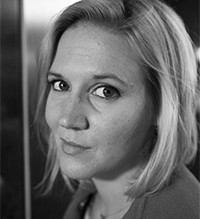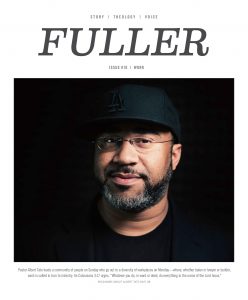
Christeen Rico’s ministry is in the marketplace. Leading global expansion efforts for a major technology company in California’s Silicon Valley, she plans and launches new retail stores in emerging countries—and to Christeen, opening each new store is similar in surprising ways, she says, to planting a church. In her view, a company mindset that stresses enriching customers’ lives through technology becomes a missiological venture.
“I’m constantly asking myself, ‘Why are we expanding in this market? What’s right for our customers and our company here? How can our work benefit the local community and deliver products that inspire?’ I’m grateful to have company leaders who push us to imagine new possibilities,” she says, “that build up a community and leave it better than we found it. This kind of mindset means offering free workshops for students, teachers, and entrepreneurs in our stores. Or inviting local artists to showcase their artwork there. Or doing all we can to minimize our environmental impact. A key verse for me,” says Christeen, “is Proverbs 11:10: ‘When the righteous prosper, the city rejoices.’”
Weaving her faith into her work has not always been an easy proposition for Christeen. The strength of that faith, though, has been there since her years growing up as the youngest of eight children in an active churchgoing family. Shy and quiet as a child, she went off to college on the East Coast and returned with new evangelical verve: “I was on fire for God!” Digging into the rhythms of her predominantly Filipino church in Daly City, California, Christeen went on mission trips, served on church council, was a dynamic youth leader. It’s no wonder, then, that her faith community sniffed a future missionary in the air. “I listened to that feedback,” she says, “and wondered if international ‘full-time missions’ was in my future.”
But there was one little thing: she was a natural in the marketplace. Having graduated from New York University’s top-tier business school, Christeen was thriving in a management consulting position with a prestigious firm, more than able to hold her own in a competitive business world. “I loved that the work put me in contact with people who were very different than me and gave me freedom to imagine new solutions for people’s problems,” she says—and her managerial gifts broke the mold of what many expected to see in an Asian Christian female. In the marketplace, Christeen was able to be herself. Mostly.
As she moved from consulting to her current global expansion position with the tech company, the dichotomy she felt between her faith and her work increasingly gnawed at Christeen. “My life was compartmentalized. I had church friends and I had secular friends. I had work goals and I had spiritual goals. I lived and worked in one city, and attended church in another. I wondered if I had listened too much to voices saying there was a strong divide between the sacred and the secular, between traditional church ministry and other jobs,” says Christeen. “I also saw that without Jesus with me in the marketplace, ambition would define me there.” But she just didn’t know what that would look like. She began to pray, often out of frustration: “God, am I being who you designed me to be? Am I maximizing your design for my life? Is this it? Do I work in business and then do this ministry stuff on nights and weekends and that’s what the peak of living my Christian faith looks like?”
Over time, God began to answer Christeen’s questions as she dove into Scripture, prayed, and searched online for resources on theology and work—steps that would launch her on a journey of discerning what it means, for her, to weave her faith into the marketplace. Then one day, while listening to a “Theology of Business” podcast by Darren Shearer, she heard an advertisement for a Faith at Work Summit to be hosted in Dallas by Fuller’s Max De Pree Center for Leadership.
“I took a risk and asked my company if they would sponsor my attendance at that summit,” Christeen says. “I knew it would be a first—I hadn’t heard of any employees sponsored to attend conferences that focused on faith or religion.” To her great surprise, they agreed to send her.
At the conference she met the De Pree Center’s director, Mark Roberts, who connected her with Fuller Formation Groups for marketplace leaders—groups of men and women who meet regularly to deepen their spiritual formation, especially around the integration of faith and work. Intrigued, Christeen joined one, and in the midst of the robust conversations and spiritual practices, her fellow group members helped clarify her identity and sense of calling. “I couldn’t have those kinds of conversations at my church,” she says. But in her group, what had been a private theological struggle became a corporate affirmation. Coming out of that experience, she says, “I now see myself as a follower of Christ and a minister of reconciliation called to the marketplace.”
 Now, in addition to helping lead her company’s Christian employee group, the 27-year-old lives out her missiological calling in the daily emails, meetings, research, and decisions that take place before and after a retail store is launched. As she dives into the complexities of that work, several principles guide her that turn her efforts into something of kingdom consequence.
Now, in addition to helping lead her company’s Christian employee group, the 27-year-old lives out her missiological calling in the daily emails, meetings, research, and decisions that take place before and after a retail store is launched. As she dives into the complexities of that work, several principles guide her that turn her efforts into something of kingdom consequence.
“I constantly ask God to show me what it looks like to grow more like Jesus in each context,” she says. “There’s no training manual, so I depend on God to show me how to do that.” She and other members of the Christian fellowship gather regularly to pray, sometimes hosting speakers or special events. They partner with other groups to do community service and support local nonprofit agencies. But Christeen emphasizes that these things must be part of a wider effort at faith and work integration. “It’s so easy to compartmentalize. That’s why we have to keep asking ourselves why we do what we do each day. Above all, am I growing more like Jesus?”
Taking seriously Scripture’s mandate to set right what is broken, Christeen practices reconciliation through small countercultural acts that place relationships on equal footing with productivity. She avoids scheduling evening meetings with team members if she knows they have families that crave their time over the supper table. She checks her inclination to correct a team member in a large meeting and instead will talk to them separately. She tries to model humility in a culture that values self-promotion, and knows she must be willing to apologize when it’s called for. “Ultimately,” Christeen says, “a key indicator of success for me is whether or not a team wants to work together again after we’ve completed a project. Relationships are just as important as successfully launching a retail store to a crowd of 5,000 excited customers.”
Seeing those excited beneficiaries of a new store, though—both employees and customers—really drives home to Christeen why she does what she does. “I see launching a store in a new market as an investment into the people of that country,” she says, and recalls with joy an opening she attended not long ago. “It’s an amazing experience to see how passionate the new employees are, the emotions and pride they have. It makes all our work worth it to see how the people’s faces light up—it’s just incredible! As followers of Christ, we need more of that kind of flourishing. Part of being a good steward is helping enable those experiences for people.” The actions of a marketplace missionary: building up a community and leaving it better than she found it.



